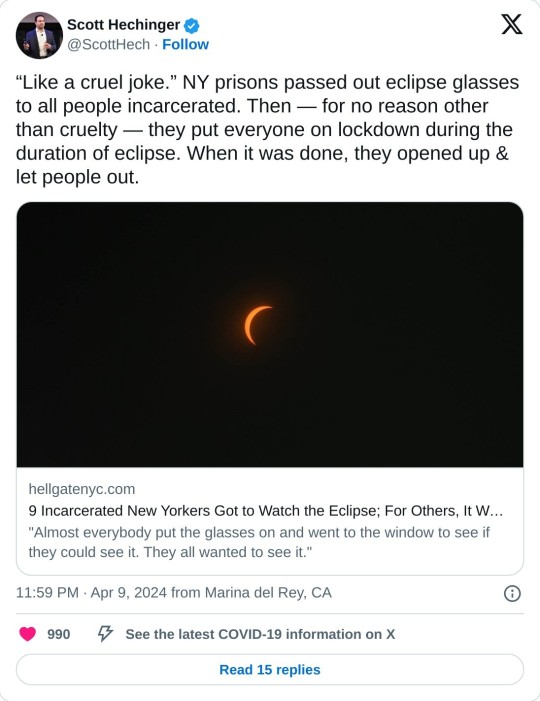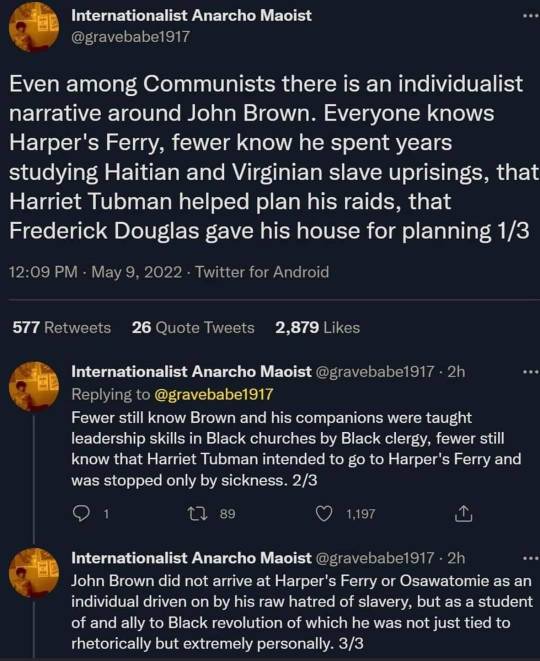#Abolition
Text
[The British imperial imaginary conceives] of Bermuda as a tiny paradise in the North Atlantic. But long before cruise ships moored up, prison ships carried hundreds of convicts to the island, first docking in 1824 and remaining there for decades. [...] [T]he use of Bermuda as a prison destination is less well known. For 40 years, British prisoners worked backbreaking days labouring in Bermuda’s dockyards and died in their thousands. [...]
[T]he notorious floating prisons known as hulks. [...] [I]n addition to locations across the Thames Estuary, Portsmouth and Plymouth, the British government used these ships as emergency detention centres in colonial outposts across the 19th century, detaining convicts in Bermuda between 1824 and 1863 and Gibraltar between 1842 and 1875. England has a long history of banishing its criminal population. In the 18th century, criminals were typically sentenced to seven years overseas in America. Many worked as plantation labourers in Maryland and Virginia [...]. Britain [...] turned to hulks to cope with rising [prison housing] numbers. Each could hold between 300 and 500 men, and they were nicknamed “floating hells” for their unsanitary and dangerous conditions.
---
[T]he government felt that convict labour could be put to use in other colonies [in addition to Australia], and so began an experiment in 1824 to send men to Bermuda. [...] Though only 20 miles long, the island was already extremely important to naval strategy. It was used as a refuelling station for British ships travelling to colonial outposts such as Halifax, Nova Scotia and the Caribbean. But the naval dockyard needed modernisation, and rather than employ local workers, convicts - a cheap and easily mobilised workforce - filled the labour gap. [...]
[M]en lived on board the ships they had sailed on (seven in total). [...] Many were injured in the dockyards, others went blind from the reflected glare of the sun as they quarried white limestone. [...] They were burnt by scorching temperatures and suffered sunstroke [...]. Bermuda also received people convicted in other British colonies, including Canada and the Caribbean. During the years of the great famine in Ireland (1845 to 1852), thousands of Irish convicts arrived on the island, many suffering from malnourishment. [...] The experiment ended after 40 years, in 1863, when dockyard repairs were completed. The remaining hulks were scuttled or broken up for scrap, and convicts were transported to Australia and Tasmania, or home to England [...].
---
Bermuda’s history as a prison island has been largely forgotten, but this story shares parallels with today. Prisons are suffering from overcrowding, and governments still detain prisoners and others on islands and modified ships. In Dorset, the Bibby Stockholm ship is housing asylum seekers [...].
The convicts who lived, worked and died in Bermuda are part of a larger global story of coercion and empire.
The product of their labour was imperial strength, but for those sent thousands of miles from home and buried in unmarked graves, the brutalities of their experience should also be remembered.
---
All text above by: Anna McKay. "Britain's forgotten prison island: remembering the thousands of convicts who died working in Bermuda's dockyards". The Conversation. 27 March 2024. [Bold emphasis and some paragraph breaks/contractions added by me. Presented here for commentary, teaching, criticism purposes.]
51 notes
·
View notes
Text
disturbed by the number of times i've seen the idea that calling gaza an open-air prison is not okay because "that implies that gazans have done something wrong", the subtext being unlike those criminals who deserve to be in prison. i'm sorry but we HAVE to understand criminalization and incarceration as an intrinsic part of settler colonialism and racial capitalism, because settler states make laws that actively are designed to suppress indigenous and racialized resistance, and then enforce those laws in even more racist and discriminatory ways so that who is considered "criminal" is indelibly tied up with who is considered a "threat" to the settler state. that's how law, policing, and incarceration function worlwide, and how they have always functioned in israel as part of the zionist project.
talking about prison abolition in this context is not a distraction from what's happening to palestinians; it's a key tool of israel's apartheid and genocide. why do you think a major hamas demand has been for israel to release the palestinians in israeli prisons? why do you think israel nearly doubled the number of palestinians incarcerated in their prison in just the first two weeks after october 7? why do they systematically racially profile palestinians (particularly afro-palestinians, since anti-blackness is baked into israel's carceral system as well, like it is in much of the world) and arrest and charge 20% of palestinians, an astonishingly high rate that goes up even higher to 40% for palestinian men? why are there two different systems of law for palestinians and israelis, where palestinians are charged and tried under military law, leading to a conviction rate of almost 100%? why do they torture children and incarcerate them for up to 20 years just for throwing rocks? why can palestinians be imprisoned by israel without even being charged or tried? why do they keep the bodies of palestinians who have died in prison (often due to torture, execution, or medical neglect) for the rest of their sentences instead of returning them to their families?
this is not to say that no palestinians imprisoned by israel have ever done harm. but incarceration worldwide has never been about accountability for those who have done harm, nor about real justice for those have experienced harm, nor about deterring future harm. incarceration is about controlling, suppressing, and exterminating oppressed people. sometimes people from privileged classes get caught up in carceral systems as well, but it is a side effect, because the settler colonialist state will happily sacrifice some of its settlers for its larger goal.
so yes, gaza is an open-air prison. that doesn't means gazans deserve to be there. it means that no one deserves to be in prison, because prisons themselves are inherently oppressive.
#free palestine#prison abolition#abolition#settler colonialism#racial capitalism#police abolition#fyi if people have seen my other post about palestinians incarcerated by israel this one doesn't have anything new i'm just upset#also while we're at it can we get rid of the term “political prisoner”#who gets imprisoned and who doesn't is always political
4K notes
·
View notes
Text
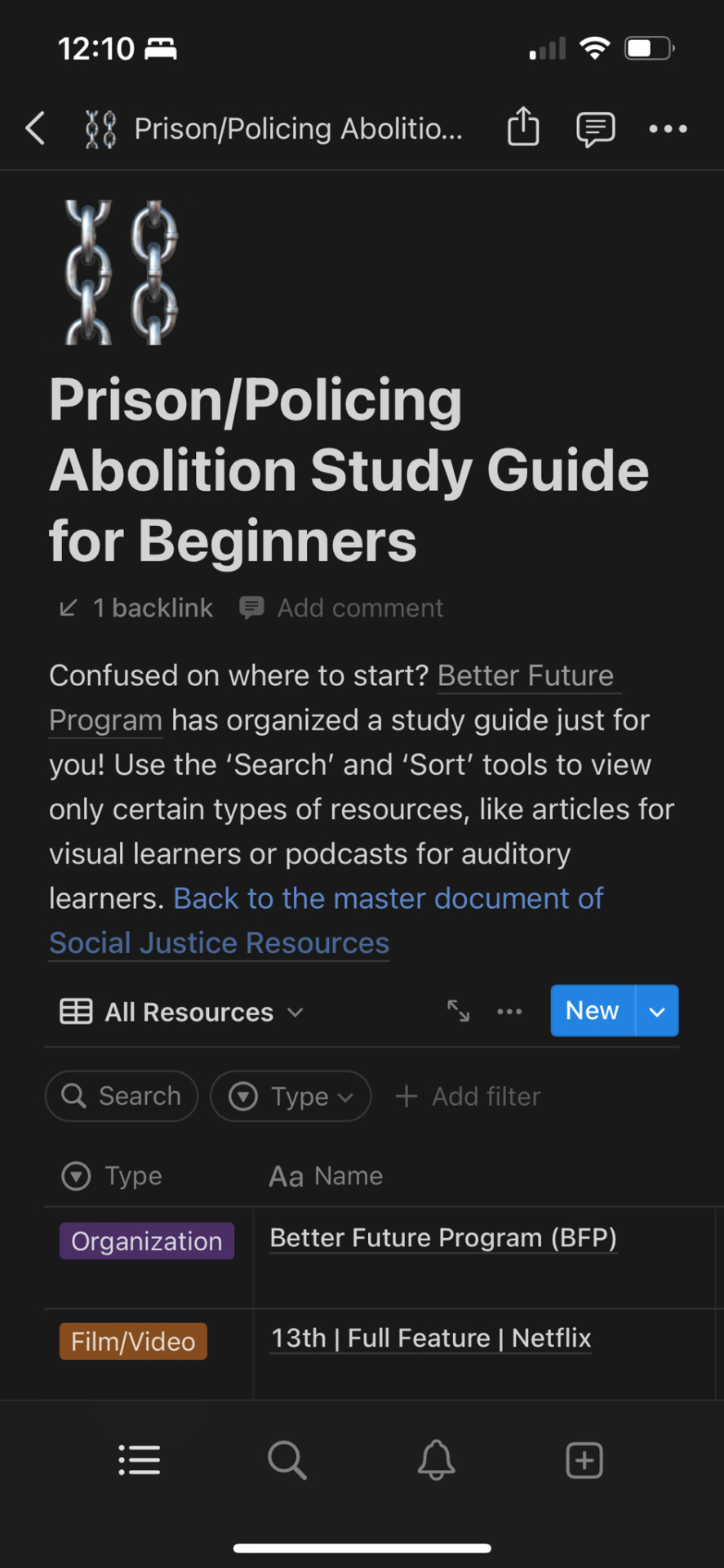
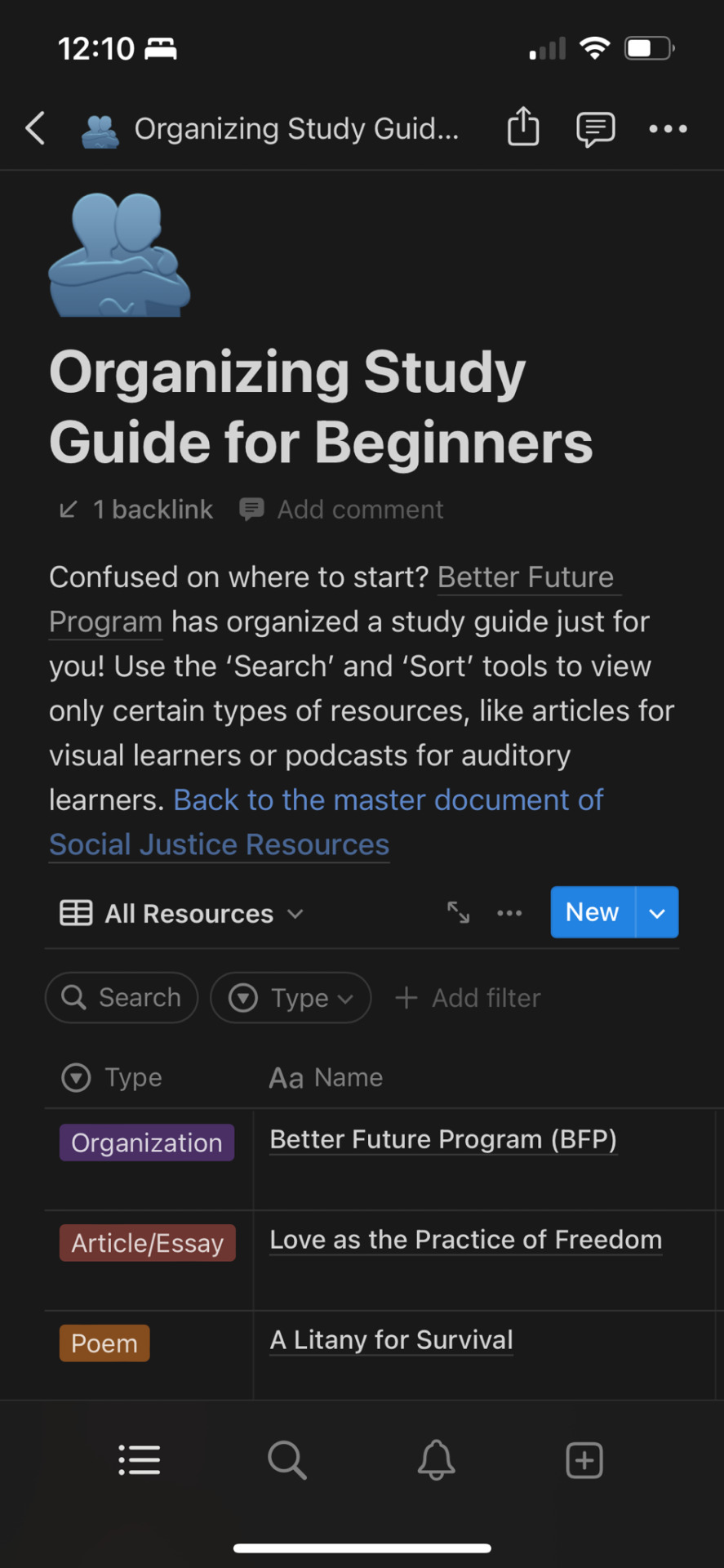

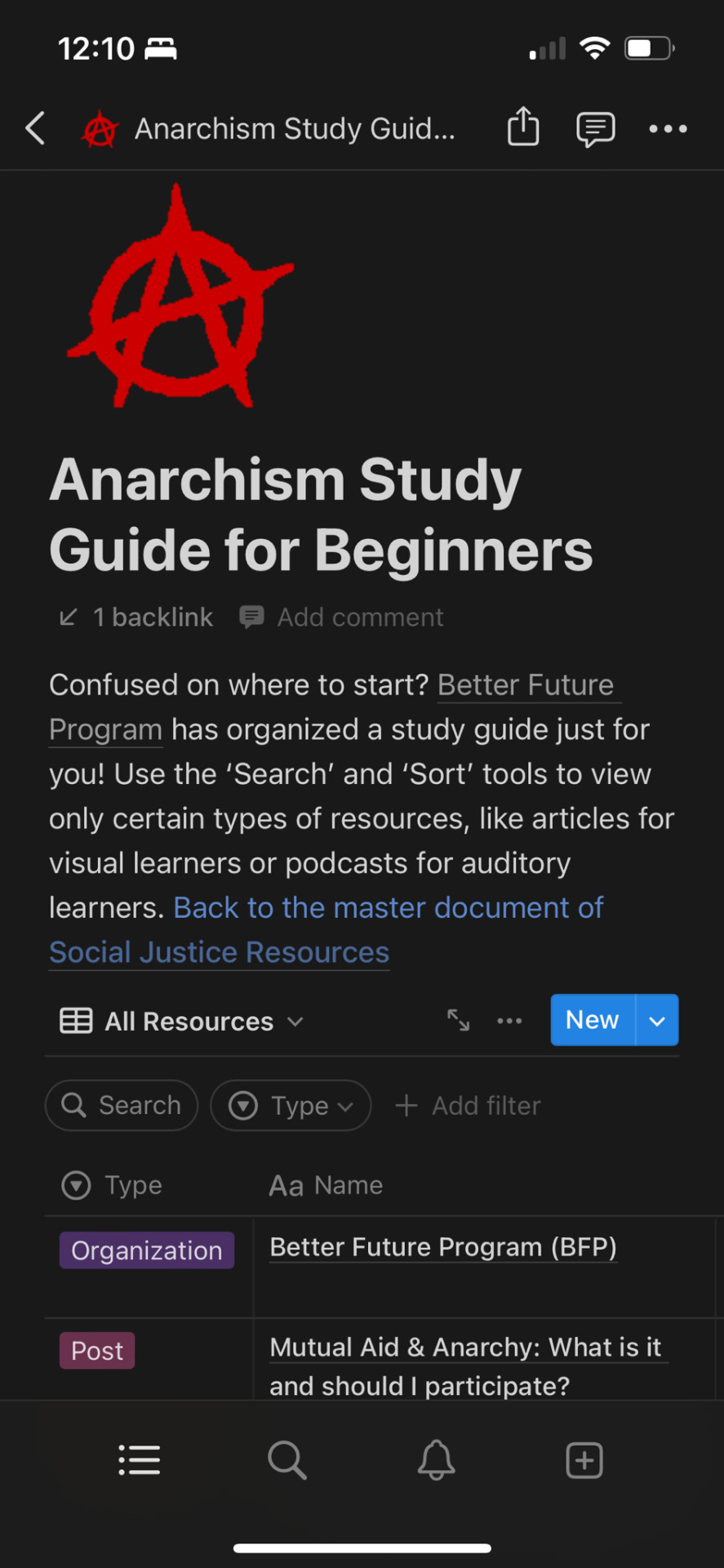
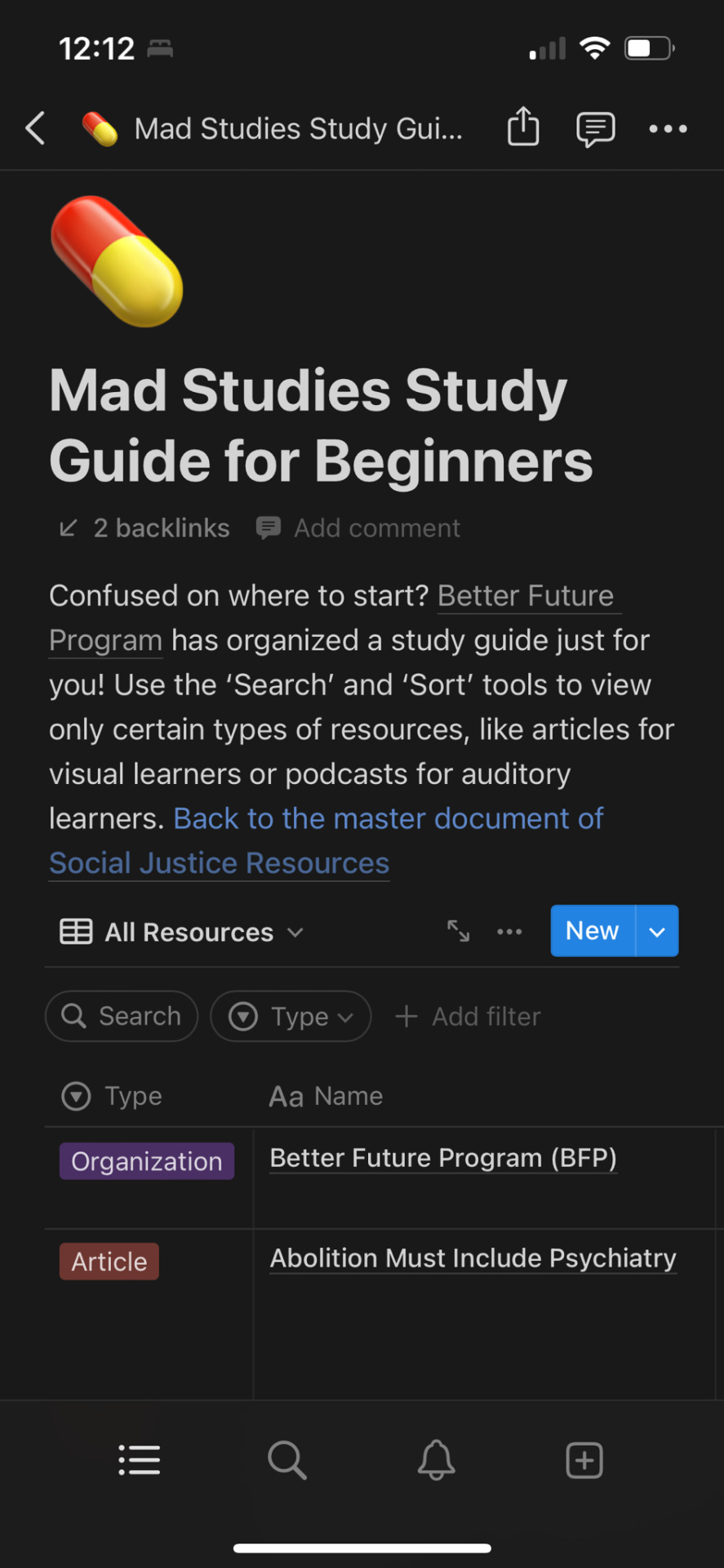
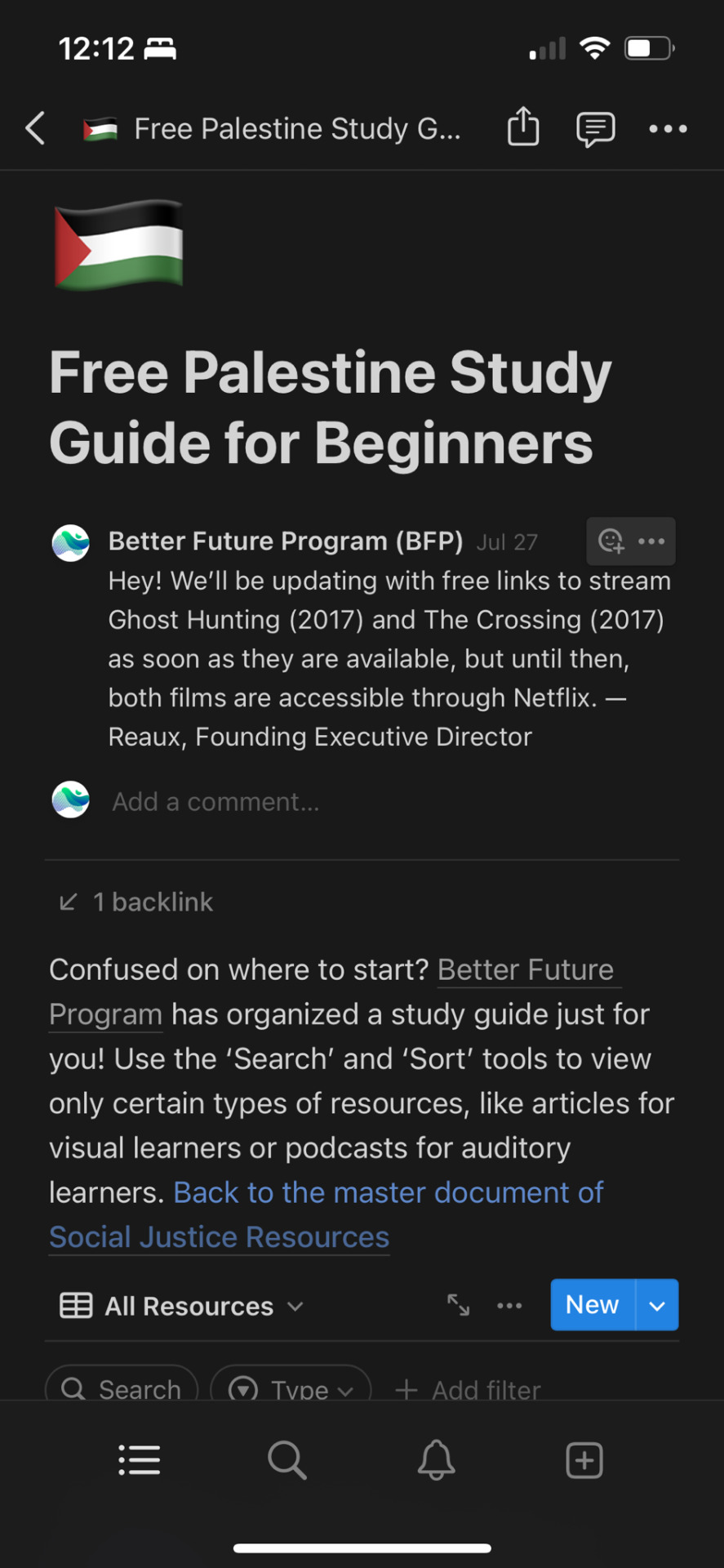
just wanted to remind everyone again not only of the 3,000+ resources offered through our Liberation Library but also of the study guides for beginners offered under each of our social justice topics!
resources can be organized by type (article, novel, podcast, video, etc.) as well as filtered and searched through. we’ve tried to make our system much more accessible than our former platform on google docs so this is such an exciting development to share with everyone.
please share to promote equitable access education!and if you’d like to volunteer with us, check out our open resources committee roles!
REBLOG THIS VERSION! image description by @bonesandblood-sunandmoon below the cut. thank you for writing one!
[Image Description: Six screenshots of beginner study guides on mobile view. The main text visible under each title reads:
Confused on where to start? Better Future Program has organized a study guide just for you! Use the ‘Search’ and ‘Sort’ tools to view only certain types of resources, like articles for visual learners or podcasts for auditory learners. Back to the master document of Social Justice Resources.
Five of the study guides have the start of a list of resources available with color coded resource types visible - Posts have a purple box, for example. Each study guide has an image. Prison/Policing Abolition has an image of chains, Organizing has two humanoid figures hugging, Classism and Anti-Capitalism has a stack of dollar bills, Anarchism has the red ‘A’ in a circle, Mad Studies has a yellow and orange capsule/pill, and Free Palestine has the flag of Palestine.
/End description.]
#reaux speaks#resources#educational equity#abolition#organizing#anti capitalism#anarchism#palestine#mad liberation#free palestine#israel
18K notes
·
View notes
Text
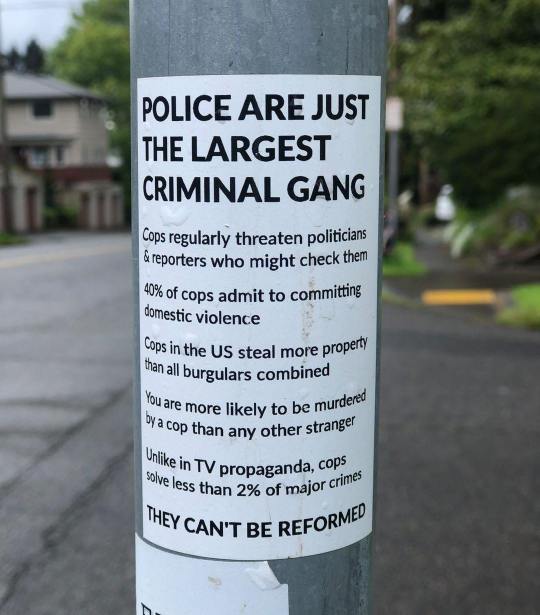
"The police are just the largest criminal gang"
Poster seen in Portland, Oregon
16K notes
·
View notes
Text

Reform is not the answer
#relevant#racism#blacklivesmatter#blm#black lives matter#fascisim#police brutality#reform#abolition#total abolition#tyre nichols#I don’t want to say another name#how many bad apples are there
4K notes
·
View notes
Text
so the supreme court just ruled that wrongful convictions can be upheld against evidence of innocence. If you’re imprisoned and sentenced to death but you didn’t do it and can prove it, it doesn’t matter. Legal counsel and evidence don’t matter. The justification is some states rights bs
like do y’all get the need to demand the complete abolition of prisons and police?? where is the veil of “public safety” when people say the criminal-legal system isn’t a function of safety, because i don’t see it. Why is there greater commitment to defending this system than building a real society of safety?
14K notes
·
View notes
Text
Good question:

In the United States, many jails and prisons can and will charge you money for every single night that you spend imprisoned, for the entire duration of your incarceration, as if you were being billed for staying at a hotel. Even if you are incarcerated for years. Adding up to tens of thousands of dollars. What happens when you’re released?
In response to this:
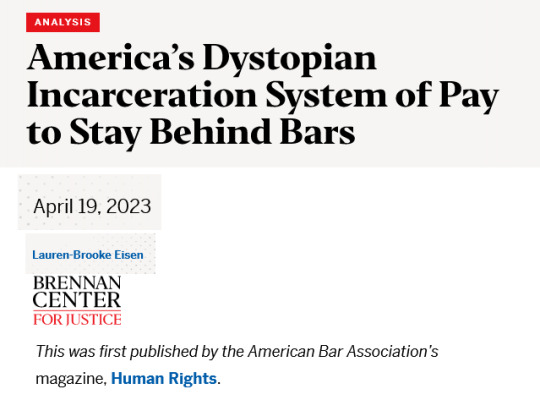


---
So.
You’re getting charged, like, ten dollars every time you even submit a request form to possibly be seen by a doctor or dentist.
You’re getting charged maybe five dollars for ten minutes on the phone.
Any time a friend or family tries to send you like five dollars so that you can buy some toothpaste or lotion, or maybe a snack from the commissary since you’re diabetic and the “meals” have left you malnourished, maybe half of that money gets taken as a “service fee” by the corporate contractor that the prison uses to manage your pre-paid debit card. So you’re already losing money every day just by being there.
What happens if you can’t pay?
In some places, after serving just a couple of years for drugs charges, almost 20 years after being released, the state can still hunt you down for over $80,000 that you “owe” as if it were a per-night room-and-board accommodations charge, like this recent highly-publicized case in Connecticut:

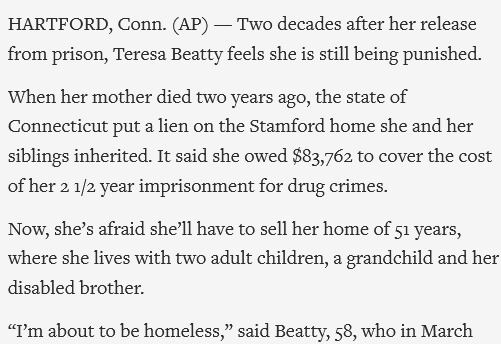
Excerpt:
Two decades after her release from prison, [TB] feels she is still being punished. When her mother died two years ago, the state of Connecticut put a lien on the Stamford home she and her siblings inherited. It said she owed $83,762 to cover the cost of her 2 1/2 year imprisonment for drug crimes. [...] “I’m about to be homeless,” said [TB], 58, who in March [2022] became the lead plaintiff in a lawsuit challenging the state law that charges prisoners $249 a day for the cost of their incarceration. [...] All but two states have so-called “pay-to-stay” laws that make prisoners pay for their time behind bars [...]. Critics say it’s an unfair second penalty that hinders rehabilitation by putting former inmates in debt for life. Efforts have been underway in some places to scale back or eliminate such policies. Two states — Illinois and New Hampshire — have repealed their laws since 2019. [...] Pay-to-stay laws were put into place in many areas during the tough-on-crime era of the 1980s and ’90s, said Brittany Friedman, an assistant professor of sociology at University of Southern California who is leading a study of the practice. [...] Connecticut used to collect prison debt by attaching an automatic lien to every inmate, claiming half of any financial windfall they might receive for up to 20 years after they are released from prison [...].
Text by: Pat Eaton-Robb. “At $249 per day, prison stays leave ex-inmates deep in debt.” AP News / The Associated Press. 27 August 2022.
---
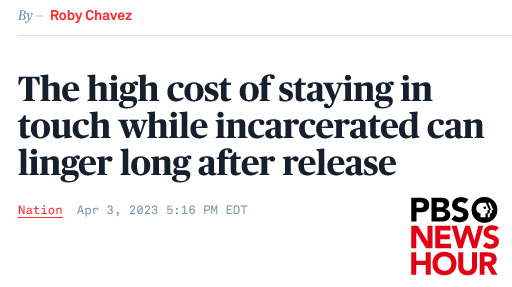
---
Look at this:
To help her son, Cindy started depositing between $50 to $100 a week into Matthew’s account, money he could use to buy food from the prison commissary, such as packaged ramen noodles, cookies, or peanut butter and jelly to make sandwiches. Cindy said sending that money wasn’t necessarily an expense she could afford. “No one can,” she said. So far in the past month, she estimates she sent Matthew close to $300. But in reality, he only received half of that amount. The balance goes straight to the prison to pay off the $1,000 in “rent” that the prison charged Matthew for his prior incarceration. [...] A PA Post examination of six county budgets (Crawford, Dauphin, Lebanon, Lehigh, Venango and Indiana) showed that those counties’ prisons have collected more than $15 million from inmates — almost half is for daily room and board fees that are meant to cover at least a portion of the costs with housing and food. Prisoners who don’t work are still expected to pay. If they don’t, their bills are sent to collections agencies, which can report the debts to credit bureaus. [...] Between 2014 and 2017, the Indiana County Prison — which has an average inmate population of 87 people — collected nearly $3 million from its prisoners. In the past five years, Lebanon’s jail collected just over $2 million in housing and processing fees.
Text by: Joseph Darius Jaafari. “Paying rent to your jailers: Inmates are billed millions of dollars for their stays in Pa. prisons.” WHYY (PBS). 10 December 2019. Originally published at PA Post.
---
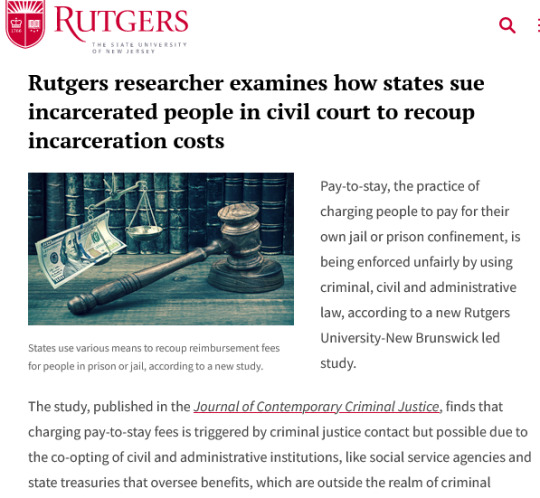
Pay-to-stay, the practice of charging people to pay for their own jail or prison confinement, is being enforced unfairly by using criminal, civil and administrative law, according to a new Rutgers University-New Brunswick led study. The study [...] finds that charging pay-to-stay fees is triggered by criminal justice contact but possible due to the co-opting of civil and administrative institutions, like social service agencies and state treasuries that oversee benefits, which are outside the realm of criminal justice. “A person can be charged $20 to $80 a day for their incarceration,” said author Brittany Friedman, an assistant professor of sociology and a faculty affiliate of Rutgers' criminal justice program. “That per diem rate can lead to hundreds of thousands of dollars in fees when a person gets out of prison. To recoup fees, states use civil means such as lawsuits and wage garnishment against currently and formerly incarcerated people, and regularly use administrative means such as seizing employment pensions, tax refunds and public benefits to satisfy the debt.” [...] Civil penalties are enacted on family members if the defendant cannot pay and in states such as Florida, Nevada and Idaho can occur even after the original defendant is deceased. [...]
Text by: Megan Schumann. “States Unfairly Burdening Incarcerated People With “Pay-to-Stay” Fees.” Rutgers press release. 20 November 2020.
---
So, to pay for your own imprisonment, states can:
-- hunt you down for decades (track you down 20 years later, charge you tens of thousands of dollars, and take your house away)
-- put a lien on your vehicle, house
-- garnish your paycheck/wages
-- seize your tax refund
-- send collections agencies after you
-- take your public assistance benefits
-- sue you in civil court
-- take money from your family even after you’re dead
8K notes
·
View notes
Text
Most Afro-Palestinians in this tight-knit community came to the region as religious pilgrims during the British Mandate for Palestine, and many have been part of the Palestinian resistance movement since Israel’s establishment in 1948. Others arrived as volunteers with the Egyptian army to fight against Zionist militias taking control of historic Palestine during the Arab-Israeli war.
The community has played a pivotal role in the history of Palestinian resistance. Locals say that the first Palestinian woman to be imprisoned for a paramilitary operation against Israel was Fatima Barnawi, a Nigerian-Palestinian detained in 1967 for the attempted bombing of an Israeli cinema in West Jerusalem.
Yet decades later, Afro-Palestinian youth continue to live their daily lives under Israeli control.
At just 17, Abdallah’s cousin, Jibrin, has already been detained five times by Israeli forces, mostly over allegations that he threw stones at Israeli police and military officers. While he and his friends face the same harassment as other Palestinians, he said, they sometimes experience “double-racism” for both being Palestinian and having dark skin.
“The soldiers are always cursing at me and interrogating me when I pass them. They try to provoke me so that I do something they could get me in trouble for,” Jibrin told Al Jazeera, noting that he has been beaten several times by Israeli police and soldiers during detentions.
“Most of those in my generation have the same experiences,” he added with a shrug. “It’s routine.”
#free palestine#palestinian prisoners' day#genocide#antiblackness#prison abolition#police abolition#abolition#zionist colonization#settler colony of israel
303 notes
·
View notes
Text
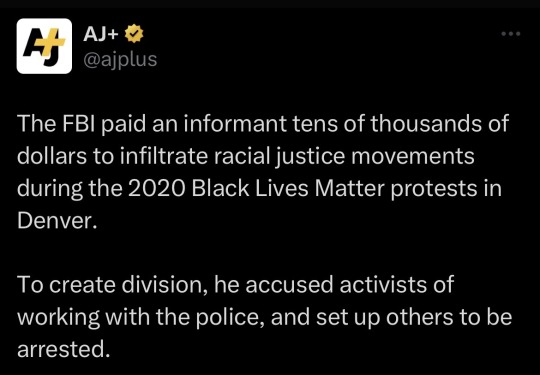
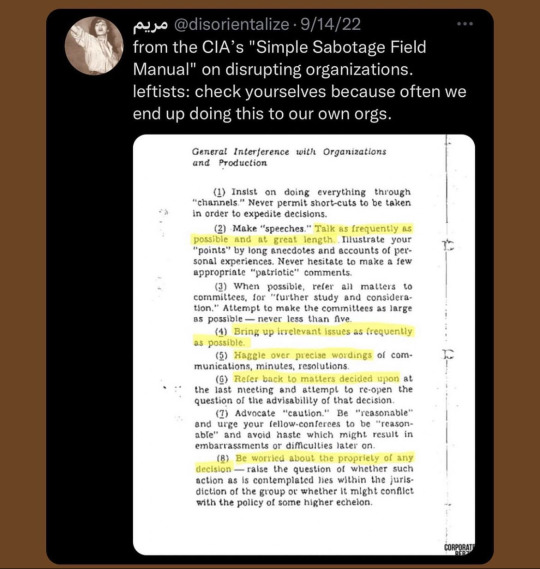
While this information may technically be new, government infiltration is not. As mentioned in the video, COINTELPRO is a perfect historical example of the insidious downfall of so many leftist grassroots organizations, and guess what? We've made posts about COINTELPRO in the past!
This information isn't made to scare you though, but to empower us all to come together even stronger, even smarter, even more diligently. We owe it to ourselves, to our communities, and to our predecessors to do at least that much. As working class citizens, we must protect one another. Do not get distracted by the divisions those in power wish to ensue.
Confused on where to start? Even if you don't apply as a volunteer, @bfpnola is a safe space for all youth activists to ask questions and receive free resources! Here’s what you need to get started:
Our Linktr.ee | Liberation Library | Discord Server | Open Youth Leadership Positions | Staff Application | Donate
#reaux speaks#resources#black lives matter#history#cointelpro#indigenous#anti capitalism#bipoc#abolition#queer#protest#intersectional feminism#disability justice#anarchism
2K notes
·
View notes
Text
today i am thinking of the fact that prisoners in the united states were put on lockdown during the eclipse. imagine not being allowed to look at the sky. i am thinking about how nat turner witnessed the land plunged into darkness by a solar eclipse in 1831 and took it as a sign from god that he should begin one of the most significant slave rebellions in the history of the so-called united states. i am thinking about how the next solar eclipse will not occur until the 2040s and hoping that we see all of our peoples liberated by then. our ancestors have watched the sun darken for millions of years. there are those of us who have always fought for liberation. things do not have to be the way they are now. we were free once, we can be free again. let this be our sign.
#also very aware that somecultures/folks do not look @ the eclipse + totally respect that obviously#i'm just thinking about abolition and humanity and history and crying#it has been a very long year#eclipse 2024#liberation#abolition#anarchy
162 notes
·
View notes
Text
reading writing from other people who have also survived solitary confinement (in so many different places, prisons + institutions + more) and sometimes the grief overwhelms me. i feel such a strong connection through the page--they put words to this swirling mess of emotions that lies under my skin when i think back to those weeks. they've found a way to talk about what it does to you and what you become and what it's like to try to come back to the world afterwards. i still can't speak about most of it. some days i wake up panicking because my door is shut; I'm glad my walls are thin and my roommate plays music slightly too loudly at night--it's easier to fall asleep when i know she's there.
this quote: "I am filled with the sensation of drowning each and every day."
and this one: "When he walked out of the SHU, he saw his first tree in 12 years."
and this one: "Solitary confinement is a living death. Death because it is the removal of nearly everything that characterizes humanness, living because within it you are still you. The lights don’t turn out as in real death. Time isn’t erased as in sleep…"
(from shane bauer reporting on solitary confinement in California: x)
i don't have words for the kind of rage i feel when i think about all the people being tortured in solitary right now and every single fucking day; loved ones + activist acquaintances + people i have never met. i want to start breaking things. i want to tear it all down. some days i feel so incredibly guilty that i saw the leaves fall outside today--how is it that i get that and she's still in there. there are no words.
#personal#solitary confinement tw#abolition#prison abolition#vent#sorry. stayed up all night reading about prisons + solitary + open air prisons + a million different fucking things. about incarceration#there's been a plethora of studies. showing that for just about everybody. 10 days is enough to start serious symptoms of distress#it's been three years since i was in solitary. i have a friend who's been in solitary confinement for seven years.#she has not been outside in seven years. there is nothing for me to do with that. except rage + fight. abolition is practice + abolition is#justice and abolition is rage and grief and love.
306 notes
·
View notes
Text
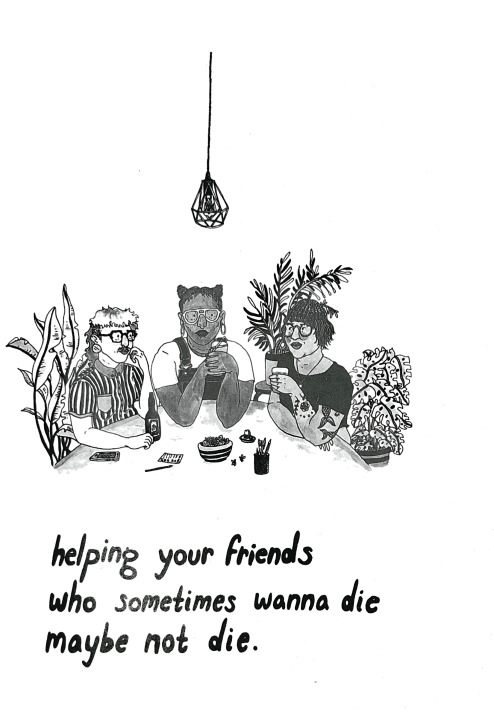
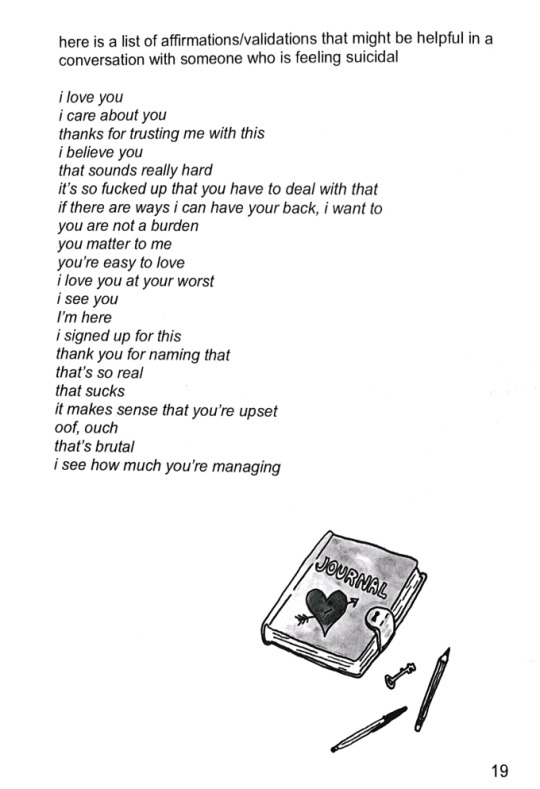
here is a zine called "helping your friends who sometimes wanna die maybe not die," a recent, excellent find of mine. perfect for those interested in harm reduction + community care in relation to suicide and other forms of mental/emotional crisis.
"helping your friends who sometimes wanna die maybe not die" by carly boyce is available for free download here. read and share.
and here is a webinar on anti-carceral crisis intervention, presented by the author!
229 notes
·
View notes
Photo
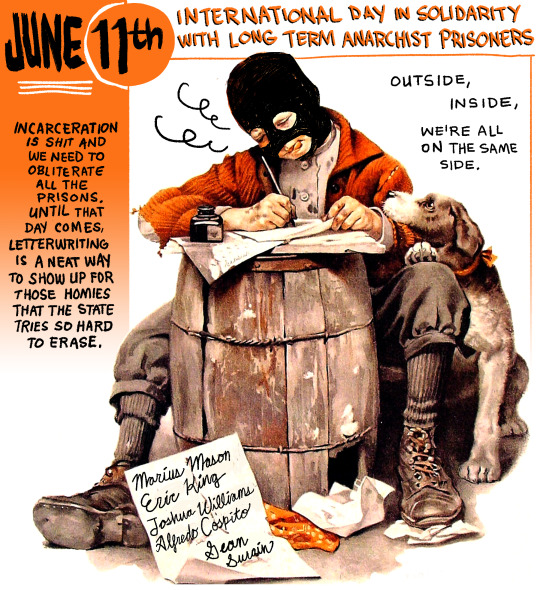
June 11 is coming! go write a letter!
Fuck prisons fuck the laws that put us in them and fuck the cops that uphold those laws.
Hella dm me if ur looking for some folks to support. Or you can check out mongoose distro, abcportland, thefinalstrawradio they're always doing a good job of looking out for the locked up homies.
Also a.b.o.comix is really cool! They get comics from queer prisoners and sellem for commissary bucks.
And lgbtbookstoprisoners is cool! I sent them a buncha Godshaper comics! You should give them books too!
530 notes
·
View notes
